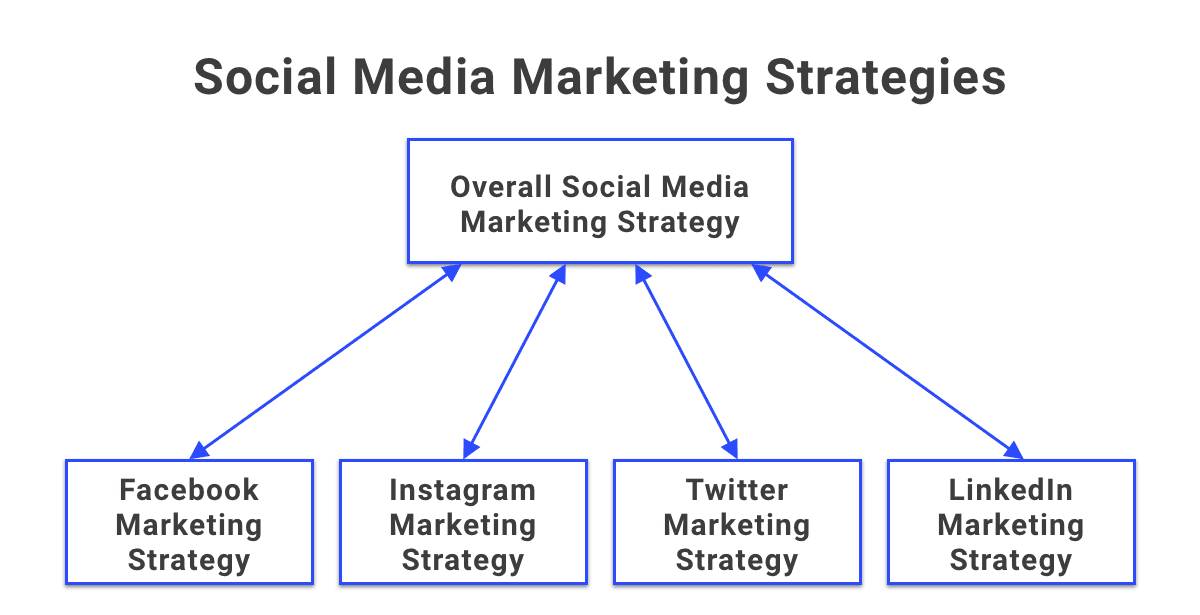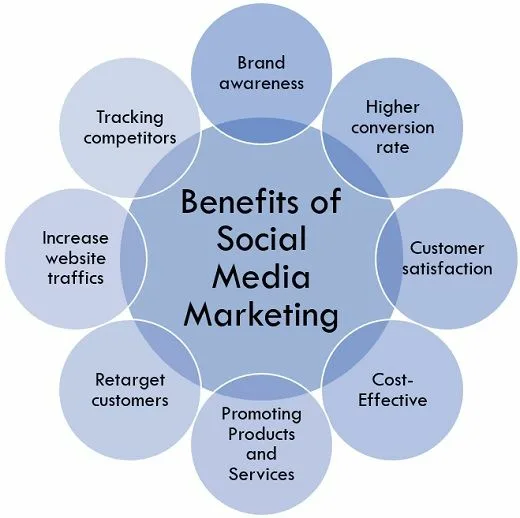The Ultimate Guide to Mastering Social Media Management

Social Media Management is the key to effectively building and nurturing your online presence. In this blog, we explore the art of Social Media Management, providing insights, strategies, and tools to help you optimize your Social Media channels, engage your audience, and achieve your business goals. Get ready to master the world of Social Media Management.
What is Social Media Marketing?
Social Media has become an integral part of businesses' marketing strategies. Effective Social Media management is crucial for building brand awareness, engaging with the audience, and driving business growth. In this blog post, we will delve into the world of Social Media management, exploring key strategies, best practices, and tools to help you optimize your Social Media presence and achieve your marketing goals.
Social Media marketing refers to the use of Social Media platforms and networks to promote products, services, or brands and engage with the target audience. It involves creating and sharing content on Social Media platforms such as Facebook, Instagram, Twitter, LinkedIn, YouTube, and others to achieve marketing and business goals.
What are Social Media Marketing Strategies?

There are numerous Social Media marketing strategies that businesses can employ to effectively promote their brand, engage with their target audience, and achieve their marketing goals. Here are some commonly used strategies:
Define Clear Goals and Objectives: Start by setting specific, measurable, attainable, relevant, and time-bound (SMART) goals for your Social Media marketing efforts. Whether it's increasing brand awareness, driving website traffic, generating leads, or boosting sales, clearly define what you want to achieve.
Identify Your Target Audience: Understand your target audience's demographics, interests, behaviors, and preferences. This knowledge will help you tailor your content, messaging, and advertising to resonate with your ideal customers.
Choose the Right Social Media Platforms: Focus on the Social Media platforms where your target audience is most active. Select the platforms that align with your goals and suit your brand's voice and content style.
Develop a Content Strategy: Create a content strategy that outlines the types of content you'll create, the frequency of posting, and the tone and style that reflect your brand. Ensure your content is valuable, informative, entertaining, and shareable. Mix different formats like text, images, videos, and user-generated content to keep your audience engaged.
Engage and Interact with Your Audience: Actively engage with your audience by responding to comments, messages, and mentions. Encourage conversations, ask questions, and run polls or contests to foster engagement. Show authenticity, respond promptly, and provide valuable information or solutions.
Leverage Influencer Marketing: Collaborate with influencers who have a significant following and influence in your industry and whose values align with your brand for authentic partnerships. Influencers can promote your brand, products, or services to their audience, increasing brand visibility, credibility, and reach.
Utilize Social Media Advertising: Leverage paid advertising features on Social Media platforms to reach a wider audience and achieve specific marketing objectives. Use targeted ads to reach your desired audience based on demographics, interests, behaviors, and more.
Monitor and Measure Results: Regularly monitor your Social Media metrics and track key performance indicators (KPIs) aligned with your goals. Use analytics tools provided by Social Media platforms or third-party tools to measure engagement, reach, conversions, and ROI.
Stay Updated and Adapt: Keep up with the latest trends, algorithm changes, and best practices in Social Media marketing. Social Media is constantly evolving, so staying informed and adapting your strategies accordingly is crucial to remain relevant and effective.
What are The Types of Social Media Marketing?
Here are some common types:
Influencer Marketing: Influencer marketing leverages the reach and influence of Social Media influencers to promote a brand or product. Businesses collaborate with influencers who have a substantial following and influence in their niche to create sponsored content, reviews, endorsements, or partnerships.
Organic Social Media Marketing: This type of Social Media marketing involves creating and sharing content organically without paid promotion. It includes posting regular updates, sharing engaging content, interacting with followers, and growing an organic following.
Paid Social Media Advertising: Paid Social Media advertising involves allocating a budget to promote content or ads on Social Media platforms. Businesses can use various ad formats, such as sponsored posts, display ads, video ads, or carousel ads, to target specific demographics, interests, behaviors, or custom audiences.
Social Media Contests and Giveaways: Contests and giveaways are effective strategies to engage and incentivize Social Media followers. Businesses can run contests that encourage user-generated content, such as photo or video contests, or offer giveaways to reward participation and increase brand visibility.
Social Media Influencer Takeovers: In this approach, businesses collaborate with influencers to take over their Social Media accounts for a specific period. The influencer creates and shares content directly on the brand's Social Media platform, providing a fresh perspective and leveraging their followers' engagement.
Social Media Live Streaming: Live streaming on platforms like Facebook Live, Instagram Live, or YouTube Live enables businesses to engage with their audience in real-time. Businesses can host live Q&A sessions, product demonstrations, behind-the-scenes glimpses, interviews, or live events.
Social Media Customer Support: Social Media platforms provide an avenue for businesses to offer customer support and address inquiries, feedback, or complaints in a timely manner. By promptly responding to customer queries or issues publicly or through direct messages, businesses can enhance customer satisfaction, demonstrate their commitment to customer service, and build a positive brand image.
Social Media Influencer Affiliate Marketing: Businesses can collaborate with influencers who have affiliate programs to promote their products or services. Influencers share unique affiliate links or discount codes with their audience, and they earn a commission for every sale generated through their referrals.
How to Start a Social Media Marketing Campaign?
Starting a Social Media marketing campaign requires careful planning and execution. Here are steps to help you get started:
-Set Clear Goals and Objectives: Define your campaign goals and what you hope to achieve through Social Media marketing. Whether it's increasing brand awareness, driving website traffic, generating leads, or boosting sales, clearly articulate your objectives to guide your campaign strategy.
-Identify Your Target Audience: Understand your target audience's demographics, interests, behaviors, and preferences. This knowledge will help you create content and tailor your campaign messages to resonate with your ideal customers.
-Choose the Right Social Media Platforms: Select the Social Media platforms that align with your target audience and campaign goals. Each platform has its own user demographics and features. Focus on the platforms where your target audience is most active and receptive to your content.
-Develop a Campaign Strategy: Create a comprehensive campaign strategy that outlines your target audience, key messages, content themes, campaign duration, and tactics to achieve your goals.
-Create Compelling Content: Develop engaging and shareable content that aligns with your campaign objectives and resonates with your target audience. Use a mix of text, images, videos, and interactive elements to capture attention and drive engagement.
-Utilize Social Media Advertising: Consider incorporating paid Social Media advertising to amplify your campaign's reach and impact. Use targeted advertising options provided by the platforms to reach your specific audience segments.
-Engage and Interact: Actively engage with your audience throughout the campaign. Respond to comments, messages, and mentions promptly. Encourage participation, ask questions, and run contests or giveaways to foster engagement.
-Track and Analyze Performance: Monitor key performance indicators (KPIs) to assess the effectiveness of your campaign. Track metrics such as reach, engagement, click-through rates, conversions, and ROI.
-Adapt and Optimize: Continuously evaluate the performance of your campaign and make adjustments as needed. Analyze the data and feedback to identify what is working well and what can be improved.
-Measure Results and Report: At the end of your campaign, measure the results against your initial goals and objectives. Prepare a campaign report that highlights the key metrics, achievements, lessons learned, and recommendations for future campaigns.
What are Social Media Marketing Benefits?
Social Media marketing offers numerous benefits for businesses and brands.
Here are some key advantages:
Increased Brand Awareness: Social Media platforms provide a vast audience reach, allowing businesses to increase brand visibility and exposure. By consistently posting engaging content and actively engaging with their target audience, businesses can raise awareness of their brand and expand their online presence.
Enhanced Audience Engagement: Social Media enables direct interaction and engagement with the audience. Businesses can receive feedback, respond to comments and messages, and build relationships with their customers. Active engagement fosters a sense of community and loyalty, leading to increased customer satisfaction and advocacy.
Targeted Advertising: Social Media platforms provide advanced targeting options to reach specific audience segments based on demographics, interests, behaviors, and more. This targeted advertising approach allows businesses to deliver relevant content and promotions to the right audience, maximizing the effectiveness of their marketing efforts.
Increased Website Traffic: Social Media platforms serve as a source of referral traffic to business websites. By sharing valuable content and compelling offers, businesses can drive traffic to their website, blog, or landing pages.
Lead Generation and Conversion Opportunities: Social Media marketing can serve as a powerful lead generation tool. By capturing leads through forms, gated content, or landing pages, businesses can nurture these leads and convert them into customers.
Brand Loyalty and Customer Advocacy: Engaging with customers on Social Media helps build brand loyalty and long-term customer relationships
Market Insights and Competitive Analysis: Social Media platforms provide valuable insights into audience demographics, preferences, and behaviors. Businesses can analyze these data to gain market insights, identify trends, and understand their target audience better.
Cost-Effective Marketing: Compared to traditional advertising channels, Social Media marketing can be more cost-effective, especially for small and medium-sized businesses.
Brand Authority and Thought Leadership: By consistently sharing valuable and informative content, businesses can establish themselves as experts and thought leaders in their industry.
Measurable Results and Analytics: Social Media marketing provides access to detailed analytics and metrics that help measure the effectiveness of campaigns. Businesses can track key performance indicators (KPIs) such as reach, engagement, conversions, and ROI.

Now that we finished talking about Social Media management services, StepaceMarketing team is happy to provide those services to you and help you apply all the strategies and gain all the benefits to make your business grow and achieve your goals properly.
